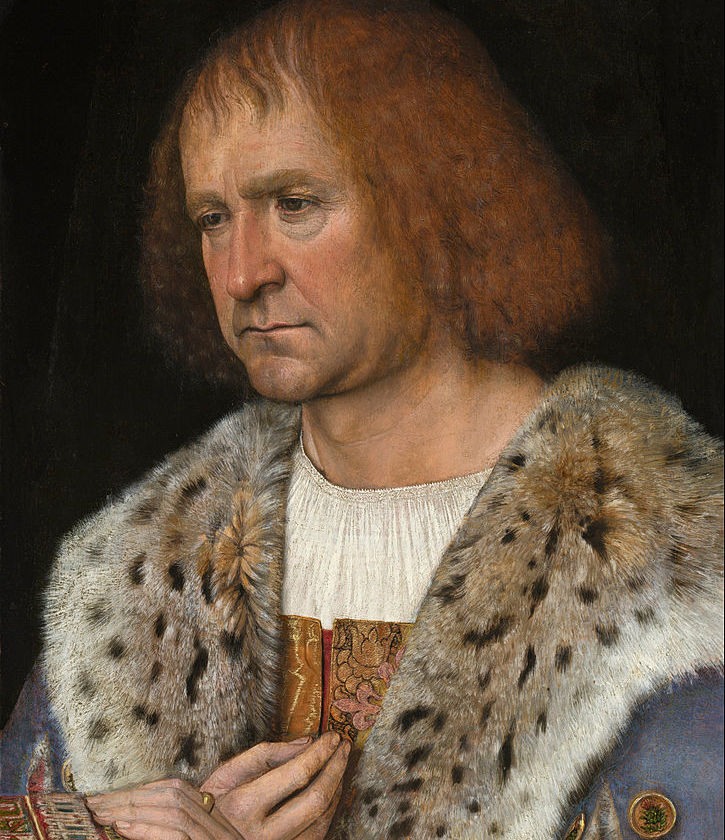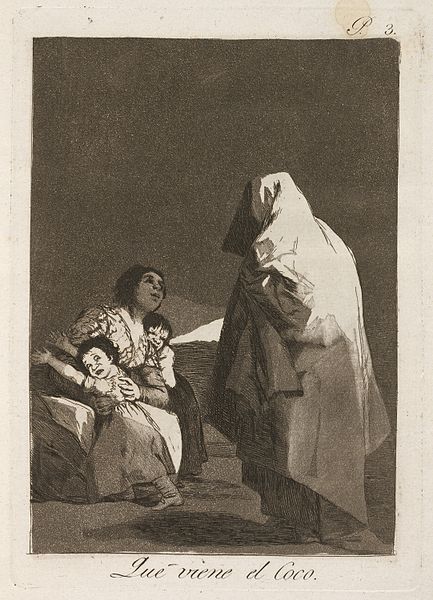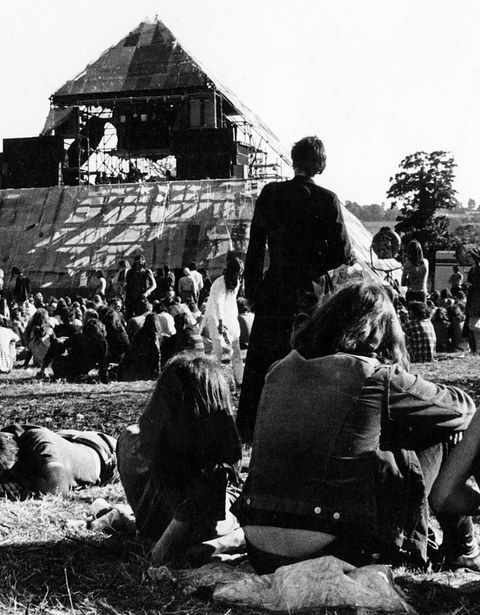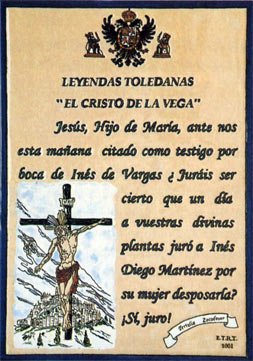One of Toledo’s most tranquil spots, the Church of San Lucas, now only disturbed by the many vehicles that park there, contains one of the city’s best-known legends, a prodigy with a certain spectral charge that D. Eugenio Olavarría wrote back in 1880: “It is an ancient history, an old popular legend that is still alive in the memory of the Toledanos”… And sitting on the floor, leaning on the walls of the temple and looking towards the Virgen del Valle, located in front of us, my companion told us the story that is going to follow:
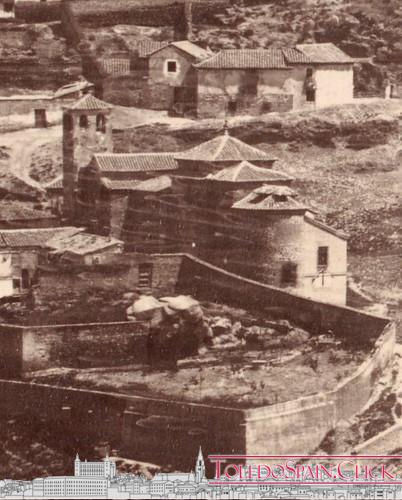 Church of St. Luke in 1857. Photograph by Charles Clifford (detail)
Church of St. Luke in 1857. Photograph by Charles Clifford (detail)
Church of St. Luke in 1857. Photograph by Charles Clifford (detail), on the blog “Toledo Olvidado”
I
The evening fell invading with its precursor fogs of the night, the ancient church of San Lucas, sitting on one of the seven hills on which Toledo is built, and an old woman, surrendered under the weight of the years, wept silently before the old altar where the miraculous image of the Virgin of Hope was seen.
The small temple, almost in the dark, was lonely and silent. No rumor reached him. Only from time to time the waters that licked the foot of the hill that supports the old Mozarabic church sent there as a groan of pain as it crashed into the prey it found in its path.
The old lady was sobbing. Without fear of indiscreet glances, and exalted in solitude his religious sentiment, he believed he was in the very presence of the Virgin before whose image he prayed and his heart beating hastily.
-Lady, Mother of Hope,” he said with loud sobs, “I am sorry to die, but I did not want to leave this world of bitterness and misery without saying goodbye to you; without seeing your divine face again, which has appeared to me so many times in dreams surrounded by heavenly splendor. You know that I have exactly fulfilled my dying mother’s command to have the Hail Mary sung in your honor here every Saturday. When I died, unfortunately, I could not take to the tomb the assurance that my prayer will be obeyed as I obeyed that of my mother. My nephew is a dissipated young man, devoid of the fear of God,… will he want to fulfill my charge? Pure Virgin, mother of God and of sinners, illuminate with a ray of light his understanding blurred by error, and may the hymn of your praise never cease to resound in these walls!
The old woman fell silent, and after a brief pause in which her lips continued to move silently, she continued:
-The doctor didn’t want to let me out; my friends opposed my wish, but nevertheless they gave in to my pleas, moved by my tears. I feel that death is approaching, I have seen you for the last time and I can die, but before leaving you forever, I would like you, queen and lady, to make my weak human reason understand that my desire will be fulfilled, that I can sleep in the sleep of death without the fear that the people will lose the habit of coming on Saturdays to listen in magical rhythms to the divine salutation that the archangel directed you. Make me understand that my nephew will open his eyes to the light and will feel them bathed by the immense radiance of your celestial beauty.
And as he made this plea with all the fervor of a pious soul, thick tears ran down his pale cheeks, flooding his thin face. His body, bent by age and suffering, pointed to a very marked arch, whose black silhouette was barely distinguishable in the growing shadows that flooded the small church.
The night was spreading through the solitary enclosure; only the glow of a lamp sloping from the ceiling, illuminated in one of the dark angles a figure of Jesus, daughter of the deliriums of Greco, that crazy genius whose brush aborted chimerical images, frightful, sometimes impotent to express those he forged in his imagination: Two wax candles, disturbing the silence as they sizzled in the shade, burned at the feet of the Virgin of Hope, whose face appreciates encouragement as it reflects the pale and mortecine light of the candles. No noise was heard. The old woman, her head bowed over her chest, continued her prayers. There was a moment when she raised her eyes to look at the image, and her face underwent a complete transformation, an expression of indefinable feelings that deeply moved her soul. A strange hallucination took hold of her. It seemed to her that the venerable image was animated on the white background of the altar, and she saw it swimming in a luminous nimbus, in an ocean of dazzling radiance in which were confused the first rays of the sun that rises and the vague tints that it leaves as it sets among the clouds that pile up as it passes like a flock of birds that accompany it to the West. The angels that fly at his feet were also animated, and by their rosy mouths, ajar as the bud of the flowers that receive the dew drops, seemed to wander a celestial smile. While the whole temple was invaded by the densest darkness, the high altar was a powerful focus of light, of radiant light, of inextinguishable light. Joy radiated in the face of the old woman, who in vain sought prayers that her immobile lips refused to repeat. And from the half-open mouth of the Virgin, and from the half-open mouth of the angels it came out as a faint, very faint breath: the echo repeated a slight murmur of words spoken in a tongue that had nothing of this world and that resembled the noise of the wind as it slipped among the branches of the sleeping trees.
And the devotee, unable to endure any longer that glow that wounded her eyes vividly, enchanted by the magical accents that sounded like delicious music in her ears, bent her head and leaned forward in a respectful and humble attitude. When the voice that so suspended it, raising it above the earth to brighter spheres, dissipated, and lifted its head again, all was gone. The images had regained their usual expression. The temple was completely dark, and only around the Virgin did the lighted candles spread their light at her feet. Then the old woman addressed the Virgin:
-Thank you, my mother, -murmured, -I have your promise and I can die peacefully.-
After this he arose sorrowfully; he took a few steps towards the altar, and, stepping on the tip of his feet, devoutly placed his lips on one end of the veil, embroidered in gold, of the image. Then clinging to the walls, to the benches, to the columns so as not to fall, she went towards the door; she dipped her fingers in the holy water basin, made the sign of the cross on her forehead, and turning for the last time to direct her last glance to the church, she went out to the street, where her servants, who had not wanted to enter with her, were waiting for her, and immediately lost herself in one of the immediate streets.
The following day the bell of the Mozarabic parish of San Lucas rang sadly asking the neighbours of the neighbourhood for a prayer for a soul that had just left the land; and, in the afternoon, an immense procession attended the burial of Doña Ana Rameros, who died the night before a few hours after her visit to the Virgen de la Esperanza. The devotees who attended the act deplored, with the death of the virtuous lady, that the customary weekly Salve was no longer sung to the mother of Jesus, because D. Diego Hernandez, to whom the goods of Doña Ana passed, was an irreligious young man and therefore incapable of respecting the promises of his old aunt. The poor, with their prayers and tears, formed the best crown in the tomb that had just been closed over the corpse of their protector.
 Mozarabic Church of St. Luke
Mozarabic Church of St. Luke
Mozarabic Church of St. Luke by © ✿OLAYA✿
II
-Believe me, sir: do not judge the illusion of my senses what is as real and positive as this air we breathe and this sun that illuminates us. I do not bring you my observations of a day, but my observations of a long time; that knowing how distrustful you are, I have hesitated a long time before deciding to come looking for you, and during these hesitations of mine I have had occasion to observe a great number of times the miracle.
-But is it possible, good Ferran, that you come to distract me with those stories that might entertain your children, but that can’t interest me in the least? If you have dreamed, why get angry making me believe in the story of your dreams? What do I have to do with the ghosts of your fever or the delusions of your fantasy?
-I swear to you, sir; it is not I who have heard that soft music, those sweet accents of which I speak to you. My wife, my children, all my family and some neighbors, we have spent hours waiting for those celestial choirs that seemed to sound inside the church. But before telling anyone, I wanted to tell you so that you may also witness the marvelous event, since the church is located so close to your farm.
-So you insist on making me believe the truth of your lies?
-Believe me, sir.
-But don’t you understand that your imagination is the author of the fact? That only in your mind there are those musics and those choruses with which you now warm my head? You are devotees of the Virgin of Hope and you have been accustomed since childhood to pray the Hail Mary at her feet every Saturday. Now that Hail Mary has been suppressed, and not wanting to persuade you to break this custom, which was already a necessity in you and you have given free rein to fantasy to invent stories, stirring up heaven and earth in support of your foolishness… By telling your stories you have come to believe them yourselves, and now you can swear, without fear of false swearing, that every week you hear music and songs in the church, closed to everyone… Are you sure that no one can enter it?
-I think so, sir; who should enter, if it is closed with stone and mud, as it is commonly said?
-Then, where do those beings who, according to you, pray the Hail Mary enter?
-Lord, it cannot be men who have such devotion, but spirits enter everywhere, without the need for open doors or unsafe windows.
-And do you believe in spirits?…
-Don Diego…
-In any case, you have a means at your disposal to get out of the doubt that torments you.
-Which one, sir?
-Who has the keys to the church?
-And who shall have them, their cleanliness being in my care?
-Then, gather your family and your neighbors to your house, and so you hear some rumor, open the doors hurriedly, without giving time for spirits or bodies to knock, to have time to disappear, and you will see how only in your fantasy there are those noises and visions.
Ferran shook his head.
-What, don’t you dare?” D. Diego
then asked him.
-Lord, you know that men do not intimidate me, because you have seen me in the war fight as good by your side. But with spirits… frankly, I’m a coward and I don’t dare, no, I don’t dare.
-For I, who fear spirits as little as men, will conduct that test next Sabbath. Wait for me in your house at the time when the Hail Mary was being prayed in the old days. I want to cure you of your fear and your apprehensions.
-Until Saturday, then, sir.
-Till the Sabbath, and don’t tell anyone about it. –
Ferran walked away, bowing respectfully to his lord before leaving, and his lord remained a little thoughtful and worried, but suddenly bursting into a loud laughter whose echo took some time to extinguish, he exclaimed:
-My goodness, and what a thing the credulity of these simple men imagines! At least they believe the good Ferran that every Saturday God sends his seraphim to the humble parish of St. Luke, so that he and the few neighbors of that neighborhood do not lose this ancient devotion. I will try to get them out of their mistake!
And taking the Toledan sword that he left on the table when he entered the room, and leaning towards the right temple the graceful hat whose wing gracefully covered a large part of his face, Don Diego left the house of his elders in which he lived alone and orphaned from the income of the estate of his parents.
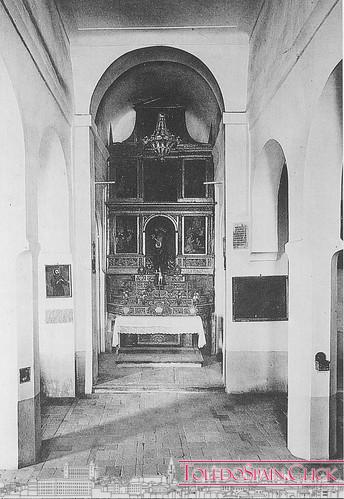 Interior of the Church of San Lucas in Toledo at the beginning of the 20th century. Rodríguez Archive
Interior of the Church of San Lucas in Toledo at the beginning of the 20th century. Rodríguez Archive
Interior of the Church of San Lucas in Toledo at the beginning of the 20th century. Rodríguez Archive (Toledo Forgotten Blog)
III
Don Diego Hernandez, who was so incredulous about what he called Ferran’s fantasy dreams, guarded a large palace-like house opposite the parish church of San Lucas, was one of the richest and most considerate knights in Toledo. Young and educated in the school of war, which advances so much the upbringing of men, and accustomed since childhood to walk around the world and see lands and villages under the flags of Spain that trembled at that time in all the horizons of the world, it is not strange that his treatment in court, where religious habits were relaxed, and his life in the camps, where they were almost lost, would have broken in him that great and sincere faith, that intimate conviction that he took out of his home when at the dawn of his existence he abandoned him in the pursuit of honor and glory, glory and honor that he had otherwise conquered. Hence he did not have all the sympathies of his aunt, the venerable Mrs. Ana de Rameros, who in no way could forgive him his distractions in the temple where he took more care of the beautiful eyes of the devotees than of the ceremonies of the priests; more of the arabesques and moldings with which the artist surrounded the altars and niches of the saints, than of the sometimes shrill images in which only a deep faith could consider the greatness of God and the sublimities of the just. And from here too, neither did Doña Ana make an effort to get her nephew to leave the court to live next to her, nor did he decide to make this small sacrifice to the old lady, the older sister of his mother, who many times, during the childhood of the ungrateful gentleman, removed from her infantile head the paternal anger, ready to punish in him any travesurilla so typical of his age and his natural revolt.
In Madrid, then, he found himself living on the income of his estate, often increased by the liberties of his aunt, who did not love him less because she believed him to be infested with error, when she received news of the very serious state in which she was in. He asked for horses, and without saying goodbye to anyone, he ran to collect, if it was still possible, the last caresses of Doña Ana; but heaven, perhaps in punishment for his disbelief, as the neighbors who were aware of D.’s opinions said. Diego, wanted to deny him this grant, which is often a consolation left by those who go to those who, less fortunate than themselves, are still wandering through this valley of tears waiting in turn for the order to undertake the journey, and when, after having broken two horses on the way, he got off at the door of his aunt’s house, he could only embrace one corpse. He wept for her, as he should, with true weeping, because her affliction was sincere, and after the days of pain had passed, he gradually gave himself over to the rich estate which death carried in his hands.
And the prophecy of those who, at the funeral of Doña Ana, lamented that the Salves sung on Saturdays to the Virgen de la Esperanza and other pious devotions of the dead lady, would be lost in oblivion, remaining only as a memory in the imagination of the Toledo people, was fulfilled. Prodigy up to the excess D. Diego in everything with him rubbed, was, nevertheless, avaricious for everything that was to give money to the Church. He believed that the inner worship of the soul is enough for God, and therefore he considered useless and superfluous the external acts that, if they give fame to the one who fulfills them as ostentatious, do not accredit him with more faith. For some time weeks passed one after the other without the church of St. Luke being opened on Saturday afternoons, once so crowded for that cause and now generally deserted. The bell ringing on such a day by the angelus, a mysterious salutation that directs the evening to the divine ideal of Mary, at that hour of twilight in which nature, widow of the sun, seems to be wrapped in the dark mantle of the night, rang in a much sadder way as if deploring its loneliness and abandonment.
Perhaps they were due to this, and they recognized by origin the feeling of the toledanos, displeased by the loss of that devotion, the rumors that ran in the district, and of which Ferrán had taken charge to be interpreter near his incredulous lord. It was said that every Saturday afternoon, at the usual time, those who passed in front of St. Luke’s door, closed with a hammer and a hammer, heard songs full of sweetness and harmony that praised the glory of the Virgin and suspended the spirits. An old woman who, not being able to get used to the idea of not praying her prayers before the miraculous image, went the first days to sit at the door of the church to ask God for the soul of Doña Ana, had heard them trembling with terror and terror, spreading the news throughout the neighborhood. The following Saturday, many others went to the same place and also listened to those melodious hymns; when they finished, one of the listeners, more dreamer or more credulous than the others, claimed to have seen sliding through the tower and getting lost in the sky, a white form; for those who heard him, that shadow was the soul of Doña Ana Rameros, who came to pray her customary Hail to the Virgin of Hope.
But this did not explain to whom those voices belonged who, with notes never plucked from the most harmonious instruments, sang praises to Mary; this did not explain anything, and, on the contrary, left all doubts standing. Some thought of giving notice to the authorities; but before doing so, it seemed to them that they should bring the miraculous event to Diego’s attention; not because of him, who did not deserve it, but because of considerations to the good memory of his noble relatives, who had already died, unfortunately, and who had left such a bad heir so that he could waste his estate, without thinking at all about divine things. It was then that Feran, who believed him, who, having sworn a hundred and a hundred times in the torment that he himself had heard the mysterious songs, took upon himself the arduous task of convincing his lord that miracles were possible, and that at that time one was being verified in his own place, it may be said, in his own domains. When the good Ferran returned from his commission, joy shone in his rough countenance; it is true that he had not managed to make the unbeliever Diego believe, but instead he had his word that he would go and witness it for himself, and for Ferran, to go was to see, and to see for a man like Don Diego, was to believe. They could bet, without fear of losing, that seldom, in the neighborhood of San Lucas, was expected the following Saturday with the anxiety of that week. A noisy event was being prepared.
 Church of San Lucas in Toledo
Church of San Lucas in Toledo
Malena Masso on flickr.com
IV
And Saturday came. Since very early in the morning there has been no talk of anything else in the neighborhood. Ferran, without leaving his house, did nothing but move to one side and another without being able to find peace anywhere. He walked very quickly through the room, sat down, got up again and walked; he spoke alone and worried: it would be said that he was going to go mad.
-But, man, what’s wrong with you? -You seem to be possessed by the devil according to how restless you are.
-Don’t you know,” Ferran replied, stopping in front of her, “don’t you know that today is the day appointed by D. Diego to come and witness what he calls an illusion of ours? In what concept am I left with him if the miraculous event doesn’t take place today? He will call me foolish and foolish, and rightly so. If I were him, I would do the same.
-But why shouldn’t it be verified, when it is verified every Saturday?
-Because… because… You should know! For anything. Only one saint, St. Thomas, saw when he asked to see. Imagine that in heaven he still doesn’t want to attract D. Diego to the right path, or he believes that his intervention in this matter will be considered by him as a trickery. And after all,” he added after a brief pause, “I don’t know what would make me happier, whether to see it or not, because those who sing that Hail Mary must be angels or ghosts, and I don’t like jokes with people from another world. Not seeing them, I’d avoid the fears I’m going to go through now, because I’ll find them everywhere… They say that seeing a spirit is a sign of mu…

